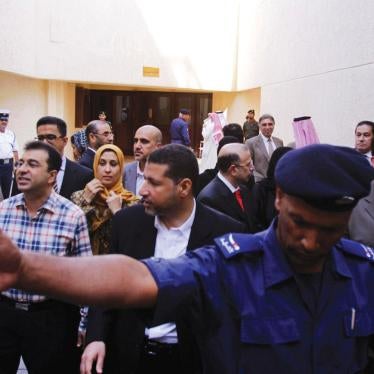(Beirut) – Bahrain has routinely convicted hundreds of opposition activists and others of politically motivated charges in unfair trials, Human Rights Watch said in a report released today. The government should void the convictions in trials before Bahrain’s military and civilian courts that fell far short of international fair trial standards, Human Rights Watch said.
The 94-page report, “No Justice in Bahrain: Unfair Trials in Military and Civilian Courts,”documents serious due process violations in high-profile trials before Bahrain’s special military courts in 2011 – including one trial of 21 prominent political activists and another of 20 doctors and other medical personnel – and in politically motivated trials before ordinary criminal courts since 2010. Serious abuses included denying defendants the right to counsel and to present a defense, and failure to investigate credible allegations of torture and ill-treatment during interrogation.
“Grossly unfair military and civilian trials have been a core element in Bahrain’s crackdown on pro-democracy protests,” said Joe Stork, deputy Middle East director at Human Rights Watch. “The government should remedy the hundreds of unfair convictions of the past year by dropping the cases against everyone convicted on politically motivated charges and by adopting effective measures to end torture in detention.”
The egregious violations of fair trial rights in political cases do not just reflect the poor practices of individual prosecutors and judges, but serious, systemic problems with Bahrain’s criminal justice system, Human Rights Watch said.
In a February 13, 2012 interview, King Hamad bin Isa Al Khalifa told Der Spiegel magazine that: “There are no political prisoners as such in Bahrain. People are not arrested because they express their views, we only have criminals.”
The Human Rights Watch report is based on more than 50 interviews with defendants, defense lawyers, and trial observers, and a comprehensive examination of available trial verdicts and other court documents. Human Rights Watch wrote to Bahrain’s attorney general in November 2010 and to the justice minister in December 2011 concerning the trials, but received no response.
At least five people died as a result of torture while in custody following the government crackdown on mostly peaceful protests that began in mid-March 2011, according to the November report of the Bahrain Independent Commission of Inquiry, a body of five international jurists and human rights experts set up by King Hamad. Human Rights Watch has documented the persistent practice of torture and ill-treatment by Bahraini security officers over the past several years.
Those whose convictions should be voided and who should be released from prison include protest leaders such as Ibrahim Sharif, Abdul Hadi al-Khawaja, Hassan Mushaima, and Abdul Wahab Hussein, Human Rights Watch said.
In one case a nurse was convicted of “incit[ing] … hatred and contempt for the governing regime” and of “destroy[ing] moveable property … in furtherance of a terrorist purpose” because she allegedly stepped on a photo of the prime minister.
Human Rights Watch called on the United States, the United Kingdom, France, and other countries to suspend all military and security-related sales and assistance to Bahrain until the government addresses the serious rights violations resulting from the suppression of peaceful demonstrations and the unfair trials.
On March 15, 2011, Hamad issued a decree proclaiming a three-month “State of National Safety,” akin to a state of emergency, which gave wide-ranging authority to Field Marshal Khalifa bin Ahmad Al Khalifa, commander of the Bahrain Defense Force, to issue sweeping regulations governing public order and enforce those measures as well as existing laws. The decree also established special military courts, called National Safety Courts, to prosecute crimes that “brought about the State of National Safety” and “def[ied] the procedures” of the decree.
Between their establishment on April 4 and their culmination in early October, these courts tried hundreds of Bahrainis caught up in the “national safety” dragnet. The armed forces commander appointed the presiding judge, always a military officer, and two civilian judges to hear these trials, and trials were held at the military complex in al-Riffa.
As of October 7, all prosecutions and appeals of people charged in connection with the political unrest of the previous months were moved to civilian criminal courts.
Proceedings in several security-related trials before civilian criminal courts prior to February 2011 raised essentially the same issues, Human Rights Watch found: politically motivated prosecutions triggered by things people wrote and said rather than actual criminal offenses, denial of basic due process rights such as right to counsel, and allegations of torture and ill-treatment during interrogation.
“King Hamad should examine the special military courts he set up by decree before claiming there are no political prisoners in Bahrain,” Stork said. “In case after case, people were convicted for their political beliefs, for the slogans they chanted, and for joining large peaceful rallies that the Crown Prince had publicly proclaimed were protected by Bahrain’s constitution.”







